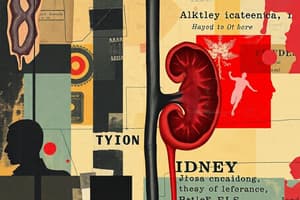Podcast
Questions and Answers
Which of the following best describes the primary function of CamScanner?
Which of the following best describes the primary function of CamScanner?
- To create multimedia presentations.
- To edit images and enhance photo quality.
- To scan documents and convert them into digital formats. (correct)
- To manage file storage in the cloud.
What potential benefit does CamScanner offer for users?
What potential benefit does CamScanner offer for users?
- Improved automation for document processing. (correct)
- Ability to create 3D models from images.
- Offline document editing capabilities.
- High-speed internet access.
Which feature is most likely NOT associated with CamScanner?
Which feature is most likely NOT associated with CamScanner?
- Multi-page scanning.
- Video conferencing tools. (correct)
- Optical Character Recognition (OCR).
- Document sharing options.
Which device types can primarily utilize CamScanner functionalities?
Which device types can primarily utilize CamScanner functionalities?
What security concern may arise when using CamScanner?
What security concern may arise when using CamScanner?
Flashcards
What is CamScanner?
What is CamScanner?
CamScanner is a mobile app that allows users to scan documents, photos, and other paper-based materials, converting them into digital files.
What types of documents can CamScanner scan?
What types of documents can CamScanner scan?
CamScanner can scan various document types, including receipts, articles, business cards, whiteboards, and handwritten notes.
How does CamScanner enhance scanned images?
How does CamScanner enhance scanned images?
CamScanner offers options to enhance scanned images by adjusting brightness, contrast, and color. It can also remove shadows and straighten edges.
How can you share scanned documents from CamScanner?
How can you share scanned documents from CamScanner?
Signup and view all the flashcards
How does CamScanner help organize scanned documents?
How does CamScanner help organize scanned documents?
Signup and view all the flashcards
Study Notes
Renal Failure
- Renal failure is a significant loss of kidney function, where less than 10-20% of normal glomerular filtration rate (GFR) remains.
- It can be acute (rapid onset, potentially reversible) or chronic (slow progression, permanent).
- Chronic renal failure results from progressive kidney damage and loss of function, often categorized into stages based on GFR loss.
Pathophysiology of Renal Failure
- Dysfunction can be glomerular or tubular.
- Glomerular damage affects filtration, leading to reduced GFR and retention of substances normally cleared.
- Tubular damage affects reabsorption, resulting in large volumes of dilute urine and electrolyte/nutrient loss.
Causes of Chronic Renal Failure
- Chronic glomerulonephritis
- Chronic infections
- Renal obstruction
- Exposure to toxins or drugs
- Diabetes
- Hypertension
- Nephrosclerosis
- Diabetic nephropathy
- Alport syndrome
- Polycystic kidney disease
- Interstitial nephritis or pyelonephritis
Signs and Symptoms of Chronic Renal Failure
- Neurological: Weakness, fatigue, confusion, seizures, and sleep disturbances.
- Integumentary: Gray-bronze skin, dry/flaky skin, uremic frost, itching, bruising.
- Cardiovascular: Hypertension, edema, pericarditis, enlarged neck veins.
- Hematological: Anemia, bleeding tendency, thrombocytopenia.
- Pulmonary: Crackles, thick sputum, shortness of breath.
- Gastrointestinal: Ammonia breath, metallic taste, nausea, vomiting, and constipation.
Psychological Symptoms
- Denial
- Anxiety
- Depression
- Psychosis
Investigations
- Hb, WBC, Sickling, Platelet Count, Blood film
- Urea, Electrolytes
- Creatinine
- Calcium, Phosphate
- Alkaline phosphatase
- Lipids
- Urinalysis
- Chest X-ray
- Fasting blood glucose
Treatment
- Treatment objectives include early detection, hypertension control, blood glucose control, treatment of other causes, and prevention of complications.
- Non-pharmacological treatment includes general health advice, avoiding nephrotoxins, strict fluid control, and maintaining electrolyte balance.
- Pharmacological treatment involves various medications to control electrolytes, hypertension, anemia, etc.
- Medical treatment may include dialysis and transplant.
Acute Renal Failure
- Characterized by sudden onset and a significant, frequently reversible reduction in renal function.
- Causes include prerenal failure (decreased perfusion), intrarenal failure (renal damage), and postrenal failure (obstruction after filtration).
- Key signs and symptoms often include oliguria (low urine output).
- Specific types of intrarenal failure include ischaemic acute tubular necrosis and nephrotoxic acute renal failure.
Complications
- Infections
- Hypertension
- Heart failure
- Hyperkalemia
- Convulsions
- Coma
Nursing Management
- Comprehensive assessment, including patient history, vital signs, neurological signs and symptoms.
- Fluid balance monitoring, proper fluid management, and dietary limitations.
- Medication monitoring (especially insulin), and management of secondary complications.
Tetanus
- Infectious disease caused by Clostridium tetani spores.
- Spores are found in soil, dust, and animal feces.
- Transmission is through contamination of wounds, such as puncture wounds, burns, and other breaks in the skin.
- Symptoms include difficulty opening mouth, muscle spasms, and general stiffness.
Diabetes Mellitus
- Chronic multisystem disease related to abnormal insulin production or impaired insulin utilization.
- Types: Type 1 (autoimmune destruction of beta cells), Type 2 (insulin resistance), gestational.
- Key symptoms can include excessive thirst, frequent urination, increased appetite.
- Diagnosis is based on fasting or postprandial blood glucose measurement (or A1c levels), testing for ketones.
Diabetic Ketoacidosis (DKA)
- Dangerous complication of diabetes, indicated by high blood glucose, ketosis, acidosis and dehydration.
- Causes include, but are not limited to interruptions in treatment or missed insulin doses, undiagnosed diabetes or other stressors.
- Manifestations of severe dehydration, electrolyte imbalance, abdominal pain, fruity breath, and altered mental status.
Studying That Suits You
Use AI to generate personalized quizzes and flashcards to suit your learning preferences.



